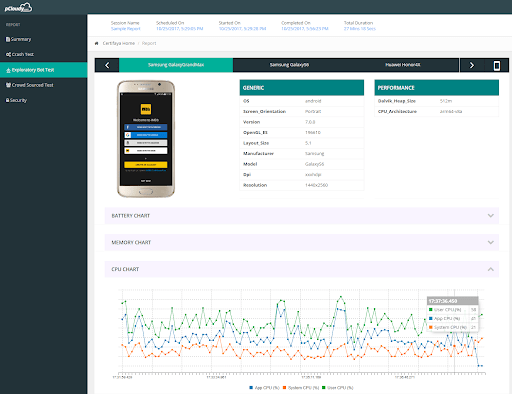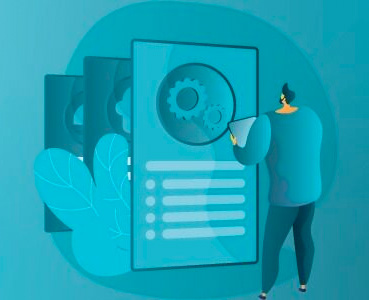The name Robotic Process Automation(RPA) is enough to describe itself. In other words, RPA is a kind of trending automation that can help switching from complete daily routine manual tasks to automating and optimizing the business process by seeking help from the tech world.
RPA is a great concept to adopt when there is a need to:
- Automate monotonous manual tasks which are mostly:
- Repetitive
- Rule-based
- Time Consuming
- Requires more human efforts
- Apply same RPA strategy across different industries
- Use software robots or may be Artificial Intelligence
Adoption of efficient RPA process can further result in:
- Enhanced accuracy
- Quick improvements in efficiency and productivity
- Maintaining compliance
- Cost reduction
- Early stage deployment
- Client or customer satisfaction
As per global studies, Robotic Process Automation (RPA) has been categorized in two parts:
- Simple RPA: This refers to automation of any daily basis routine tasks that doesn’t require any high level of intelligence. For example, automation of data entry processes can be considered as Simple RPA.
- Cognitive RPA: This refers to automation that involves human action or command for processing of the RPA. As an example, using Google maps to find the shortest and less traffic route to reach a destination can be considered as cognitive RPA.
How is Test Automation Different from Robotic Test Automation?
The terms Test Automation and Robotic Process Automation sound similar because of the common word “Automation” which offers the same feature of reducing manual efforts.
However, these two types of automation have a lot of differences. Let’s quickly have a look at the differences:
| Test Automation | Robotic Process Automation |
|---|---|
| Test automation automates the product test cases | Robotic Process Automation automates the business processes |
| Can be applied to software products only | Can be applied on products as well as on business processes |
| Knowledge of programming languages is a must for test automation | RPA provides a drag and drop feature to automate the specific process. Hence, programming knowledge is not mandatory |
| Can only be used by a particular set of users like developers or testers | Can be used across different teams and industries |
| Test automation is limited to software environments like Selenium can only be used to automate web applications | RPA can be used on a variety of software environments |
| Test automation tools cannot be utilized for Robotic Process Automation | At a basic level, RPA tools can be considered as testing tools |
| Test automation can execute only what is coded in scripts | RPA tools runs on basis of AI engine that can process information like a human |
| Some popular test automation tools are Selenium, HP – UFT/QTP, Appium | Some popular RPA tools available are Automation Anywhere, UiPath, Blueprism etc |
With regards to test automation, there are few myths of Robotic Process Automation. Let’s discuss the same and burst it.
Myth 1 -> Testing with RPA is similar to Test Automation :
Now that we are aware of the differences between test automation and robotic process automation, we know RPA has reached the next level of automation where no or limited coding skills are required. Unlike test automation, RPA can be used to automate anything with no dependency on the targeted system. RPA can be considered as a testing tool, however, it cannot be replaced with test automation. Moreover, RPA is not related to codeless testing tools and hence cannot be replaced with such platforms as well.
Myth 2 -> RPA can minimize the number of jobs in market
As per the report published by McKinsey Global Institute, the work done by machines with human collaboration is more effective, so as of now, there is no such studies in the market that can prove RPA eating up jobs. Thinking in a positive way, using RPA we can automate repetitive tasks so that professionals can focus more on other complex tasks which require human intelligence.
Myth 3 -> Test Automation tools can be used for RPA
Nowadays, the tech market is literally flooded with test automation tools like Selenium, Appium, UFT, etc. However, such tools cannot be used for RPA as they work on software products only. RPA is mostly applied to automate business processes and owns a different set of tools to fulfill the needs.
Facts about Robotic Process Automation
Experts have predicted that Robotic Process Automation is a biggest trend now in the tech world, based on the reports from CGI and other resources, below are few facts collected on RPA:
- RPA tools can provide enhanced virtualization and analytics which are beneficial for business
- Processing time with RPA tools can be reduced by 40%
- RPA is a strategic decision, it is usually implemented after analysing the ROI
- RPA has boosted up the growth of IoT and big data tech products
- Using RPA, average 47% of the tasks can be automated
Download a Free Poster of the different AI Driven Test Approaches Available
How Artificial Intelligence and Machine Learning Can Improve Test Automation?
Artificial intelligence (AI) and Machine Learning (ML) have transformed multiple sectors of the economy. Work sectors such as technology, finance, healthcare, education, retail, etc. are leveraging AI at various levels to automate tasks, make data driven decisions, and reduce costs.
Adoption of AI in software testing aims to make testing smarter and more efficient. With the use of AI and ML, different types of reasoning and problem solving techniques can be applied to automate and improve testing. As a result, AI can help reduce the time consumed during manual testing work so that teams can focus on other complex tasks and build a quality assured product.
Move towards futuristic app testing with AI And DevOps
The current state of AI uses autonomous and intelligent agents referred to as “test bots”. These test bots are automated to perform activities such as application discovery, test generation, detect failures etc. Machine learning develops such test bots in a robust way to act under conditions of uncertainty. Below are few examples of AI-driven testing approaches:
- Differential testing : As the name suggests, it extracts the comparison between application versions, classifies the differences and learns from the feedback as per the classification.
- Visual testing : This refers to image based testing and screen comparisons to test the look and feel of an application.
- Declarative testing : With this, the idea is to specify the intent of the test in terms of domain specific language and allow the system to figure out how to carry out the test by itself.
- Self-healing automation : Here, self healing refers to auto detecting the element selection in the case when UI changes are made.
The test automation that we perform on daily basis is very uncertain and can be unstable when not utilizing the ML technologies, possible reasons can be:
- The testing can become unstable in the case when UI elements are dynamic or can change over time by developers.
- Testing stability gets directly impacted when the changes are made to the test data on which the test scripts are dependent.
- Test automation scripts without ML are static, they cannot automatically adopt changes and overcome the consistent failures.
To overcome the above mentioned reasons and enhance test stability over time. One would need to make some tweaks with just a few test analysis abilities and self healing techniques. It is important to adopt AI/ML that could help test automation framework automatically identify the change made to an element, script flow that is added in predefined test automation steps, detect failures, provide quick alerts to fix or auto fix them on the fly. With such enhancements and capabilities, test scripts are mostly embedded to CI/CD pipeline that makes execution much smoother and requires minimal intervention of developers.
pCloudy Certifaya, An AI Powered App Testing Platform
The new trend of intelligent automation has proposed a new way of exploratory testing. The concept of AI Testbot has been introduced to reduce the burden on the QA team.
In exploratory testing, AI Testbot investigates and reports bugs in case of functionality crashes or unexpected errors pop-ups. For each test iteration, it has the power to store execution logs, video recordings and screenshots for future references.
Certifaya AI powered App Certification Engine
pCloudy’s Certifaya features a testbot that allows a tester to upload an application that needs to be tested and sit back tight until the test report is handed over. The key feature of this testbot is that – it not only performs exploratory testing but also covers the cross device testing on different device variants. Once an application is uploaded and a session is triggered, the smart bot crawls inside the application without any human intervention and digs up each random corner case with a motive to uncover maximum bugs. As soon as the Certifaya session gets completed, an insightful report gets mailed to the team to document the test results.

Certifaya Report
The comprehensive report includes scenarios performed by the testbot along with logs and snapshots. The functionality performance score is also wrapped up in the report in the form of charts and graphs like battery chart, memory chart, CPU chart in addition to each frame rendering time.
In agile methodology where software is released in multiple small iterations and developers have to wait for rapid feedback from testers, the testbot plays a vital role in performing quick exploratory testing for new software versions and smoke testing for the entire build deployed.
Conclusion
Advancements in the Robotic Process Automation, Artificial Intelligence and Machine Learning technologies have made significant progress in recent years. The future of Automation lies in leveraging these technologies at the earliest stages to see faster testing and release of apps in the App testing industry. While these technologies are not restricted to the App testing space. We are sure that the contribution of RPA, AI and ML will significantly transform the app testing industry in the near future.



 December 12, 2024
December 12, 2024
 November 22, 2023
November 22, 2023




